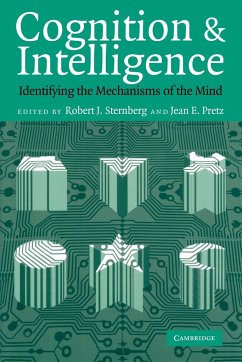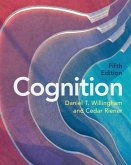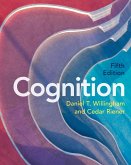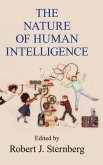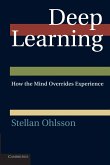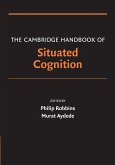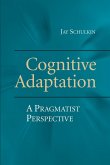Robert J. Sternberg / Jean E. Pretz (eds.)Identifying the Mechanisms of the Mind
Cognition and Intelligence
Identifying the Mechanisms of the Mind
Herausgeber: Sternberg, Robert J.; Pretz, Jean E.
Robert J. Sternberg / Jean E. Pretz (eds.)Identifying the Mechanisms of the Mind
Cognition and Intelligence
Identifying the Mechanisms of the Mind
Herausgeber: Sternberg, Robert J.; Pretz, Jean E.
- Broschiertes Buch
- Merkliste
- Auf die Merkliste
- Bewerten Bewerten
- Teilen
- Produkt teilen
- Produkterinnerung
- Produkterinnerung
Written by well-known experts, this book is about psychological research on intelligence and the various factors that influence its development. The volume summarizes and synthesizes the past 30 years of literature on intelligence. Each author takes a different experimental approach to the subject, spanning research on neuroscience and perceptual speed to research on problem solving and metacognition.
Andere Kunden interessierten sich auch für
![Cognition Cognition]() Daniel T. WillinghamCognition125,99 €
Daniel T. WillinghamCognition125,99 €![Cognition Cognition]() Daniel T. WillinghamCognition215,99 €
Daniel T. WillinghamCognition215,99 €![International Handbook of Intelligence International Handbook of Intelligence]() Robert J. Sternberg (ed.)International Handbook of Intelligence124,99 €
Robert J. Sternberg (ed.)International Handbook of Intelligence124,99 €![The Nature of Human Intelligence The Nature of Human Intelligence]() The Nature of Human Intelligence93,99 €
The Nature of Human Intelligence93,99 €![Deep Learning Deep Learning]() Stellan OhlssonDeep Learning60,99 €
Stellan OhlssonDeep Learning60,99 €![The Cambridge Handbook of Situated Cognition The Cambridge Handbook of Situated Cognition]() The Cambridge Handbook of Situated Cognition68,99 €
The Cambridge Handbook of Situated Cognition68,99 €![Cognitive Adaptation Cognitive Adaptation]() Jay SchulkinCognitive Adaptation38,99 €
Jay SchulkinCognitive Adaptation38,99 €-
-
-
Written by well-known experts, this book is about psychological research on intelligence and the various factors that influence its development. The volume summarizes and synthesizes the past 30 years of literature on intelligence. Each author takes a different experimental approach to the subject, spanning research on neuroscience and perceptual speed to research on problem solving and metacognition.
Produktdetails
- Produktdetails
- Verlag: Cambridge University Press
- Seitenzahl: 360
- Erscheinungstermin: 23. Dezember 2009
- Englisch
- Abmessung: 229mm x 152mm x 22mm
- Gewicht: 584g
- ISBN-13: 9780521534796
- ISBN-10: 0521534798
- Artikelnr.: 21831438
- Herstellerkennzeichnung
- Libri GmbH
- Europaallee 1
- 36244 Bad Hersfeld
- gpsr@libri.de
- Verlag: Cambridge University Press
- Seitenzahl: 360
- Erscheinungstermin: 23. Dezember 2009
- Englisch
- Abmessung: 229mm x 152mm x 22mm
- Gewicht: 584g
- ISBN-13: 9780521534796
- ISBN-10: 0521534798
- Artikelnr.: 21831438
- Herstellerkennzeichnung
- Libri GmbH
- Europaallee 1
- 36244 Bad Hersfeld
- gpsr@libri.de
Robert J. Sternberg is IBM Professor of Psychology and Education at Yale, Director of the PACE Center at Yale, and 2003 President of the American Psychological Association. He is the author of almost 1000 publications on topics related to cognition and intelligence and has received over $18 million in grants for his research. He has won numerous awards from professional associations and holds four honorary doctorates.
Jean E. Pretz received her B.A. from Wittenberg University in Springfield, Ohio, and has received her M.A. and M. Phil. from Yale University. Her doctoral work examines the role of intuition and expertise in practical problem solving from both an experimental and a differential perspective. This project has received the American Psychological Foundation/Council of Graduate Departments of Psychology (APF/COGDOP) Graduate Research Scholarship Award, the American Psychological Association Dissertation Research Award, as well as a Yale University Dissertation Fellowship. Her research on the role of implicit processes in insight problem solving received two awards from the American Psychological Society Graduate Student Caucus. She has also received a Fulbright fellowship to study the psychology of religion in the former East Germany. Ms. Pretz has co-authored a book on creativity entitled, The Creativity Conundrum with Dr. Sternberg and Dr. James Kaufman.
Jean E. Pretz received her B.A. from Wittenberg University in Springfield, Ohio, and has received her M.A. and M. Phil. from Yale University. Her doctoral work examines the role of intuition and expertise in practical problem solving from both an experimental and a differential perspective. This project has received the American Psychological Foundation/Council of Graduate Departments of Psychology (APF/COGDOP) Graduate Research Scholarship Award, the American Psychological Association Dissertation Research Award, as well as a Yale University Dissertation Fellowship. Her research on the role of implicit processes in insight problem solving received two awards from the American Psychological Society Graduate Student Caucus. She has also received a Fulbright fellowship to study the psychology of religion in the former East Germany. Ms. Pretz has co-authored a book on creativity entitled, The Creativity Conundrum with Dr. Sternberg and Dr. James Kaufman.
Preface; 1. Information processing and intelligence: where we are and where
we are going Earl Hunt; 2. Mental chronometry and the unification of
differential psychology Arthur Jensen; 3. Reductionism vs charting; ways of
examining the role of lower-order cognitive processes in intelligence Lazar
Stankov; 4. Basic information processing and the psychophysiology of
intelligence Aljoscha Neubauer and Andreas Fink; 5. The neural bases of
intelligence: a perspective based on functional neuroimaging Sharlene D.
Newman and Marcel Adam Just; 6. The role of working memory in higher-level
cognition; domain specific vs domain-general perspectives David Z.
Hambrick, Michael J. Kane and Randall Engle; 7. Higher-order cognition and
intelligence Edward Necka and Jaroslaw Orzechowski; 8. Ability determinants
of individual differences in skilled performance Phillip Ackerman; 9.
Complex problem solving and intelligence: empirical relation and causal
direction Dorit Wenke, Peter A. Frensch and Joachim Funke; 10. Intelligence
as smart heuristics Markus Raab and Gerd Gigerenzer; 11. The role of
transferable knowledge in intelligence Susan Barnett, Stephen J. Ceci and
Hwakin Yang; 12. Reasoning abilities David Lohman; 13. Measuring human
intelligence with artificial intelligence: adaptive item generation Susan
Embretson; 14. Marrying intelligence and cognition: a developmental view
Mike Anderson; 15. From description to explanation in cognitive aging
Timothy A. Salthouse; 16. Unifying the field: cognition and intelligence
Jean Pretz and Robert J. Sternberg.
we are going Earl Hunt; 2. Mental chronometry and the unification of
differential psychology Arthur Jensen; 3. Reductionism vs charting; ways of
examining the role of lower-order cognitive processes in intelligence Lazar
Stankov; 4. Basic information processing and the psychophysiology of
intelligence Aljoscha Neubauer and Andreas Fink; 5. The neural bases of
intelligence: a perspective based on functional neuroimaging Sharlene D.
Newman and Marcel Adam Just; 6. The role of working memory in higher-level
cognition; domain specific vs domain-general perspectives David Z.
Hambrick, Michael J. Kane and Randall Engle; 7. Higher-order cognition and
intelligence Edward Necka and Jaroslaw Orzechowski; 8. Ability determinants
of individual differences in skilled performance Phillip Ackerman; 9.
Complex problem solving and intelligence: empirical relation and causal
direction Dorit Wenke, Peter A. Frensch and Joachim Funke; 10. Intelligence
as smart heuristics Markus Raab and Gerd Gigerenzer; 11. The role of
transferable knowledge in intelligence Susan Barnett, Stephen J. Ceci and
Hwakin Yang; 12. Reasoning abilities David Lohman; 13. Measuring human
intelligence with artificial intelligence: adaptive item generation Susan
Embretson; 14. Marrying intelligence and cognition: a developmental view
Mike Anderson; 15. From description to explanation in cognitive aging
Timothy A. Salthouse; 16. Unifying the field: cognition and intelligence
Jean Pretz and Robert J. Sternberg.
Preface; 1. Information processing and intelligence: where we are and where
we are going Earl Hunt; 2. Mental chronometry and the unification of
differential psychology Arthur Jensen; 3. Reductionism vs charting; ways of
examining the role of lower-order cognitive processes in intelligence Lazar
Stankov; 4. Basic information processing and the psychophysiology of
intelligence Aljoscha Neubauer and Andreas Fink; 5. The neural bases of
intelligence: a perspective based on functional neuroimaging Sharlene D.
Newman and Marcel Adam Just; 6. The role of working memory in higher-level
cognition; domain specific vs domain-general perspectives David Z.
Hambrick, Michael J. Kane and Randall Engle; 7. Higher-order cognition and
intelligence Edward Necka and Jaroslaw Orzechowski; 8. Ability determinants
of individual differences in skilled performance Phillip Ackerman; 9.
Complex problem solving and intelligence: empirical relation and causal
direction Dorit Wenke, Peter A. Frensch and Joachim Funke; 10. Intelligence
as smart heuristics Markus Raab and Gerd Gigerenzer; 11. The role of
transferable knowledge in intelligence Susan Barnett, Stephen J. Ceci and
Hwakin Yang; 12. Reasoning abilities David Lohman; 13. Measuring human
intelligence with artificial intelligence: adaptive item generation Susan
Embretson; 14. Marrying intelligence and cognition: a developmental view
Mike Anderson; 15. From description to explanation in cognitive aging
Timothy A. Salthouse; 16. Unifying the field: cognition and intelligence
Jean Pretz and Robert J. Sternberg.
we are going Earl Hunt; 2. Mental chronometry and the unification of
differential psychology Arthur Jensen; 3. Reductionism vs charting; ways of
examining the role of lower-order cognitive processes in intelligence Lazar
Stankov; 4. Basic information processing and the psychophysiology of
intelligence Aljoscha Neubauer and Andreas Fink; 5. The neural bases of
intelligence: a perspective based on functional neuroimaging Sharlene D.
Newman and Marcel Adam Just; 6. The role of working memory in higher-level
cognition; domain specific vs domain-general perspectives David Z.
Hambrick, Michael J. Kane and Randall Engle; 7. Higher-order cognition and
intelligence Edward Necka and Jaroslaw Orzechowski; 8. Ability determinants
of individual differences in skilled performance Phillip Ackerman; 9.
Complex problem solving and intelligence: empirical relation and causal
direction Dorit Wenke, Peter A. Frensch and Joachim Funke; 10. Intelligence
as smart heuristics Markus Raab and Gerd Gigerenzer; 11. The role of
transferable knowledge in intelligence Susan Barnett, Stephen J. Ceci and
Hwakin Yang; 12. Reasoning abilities David Lohman; 13. Measuring human
intelligence with artificial intelligence: adaptive item generation Susan
Embretson; 14. Marrying intelligence and cognition: a developmental view
Mike Anderson; 15. From description to explanation in cognitive aging
Timothy A. Salthouse; 16. Unifying the field: cognition and intelligence
Jean Pretz and Robert J. Sternberg.

